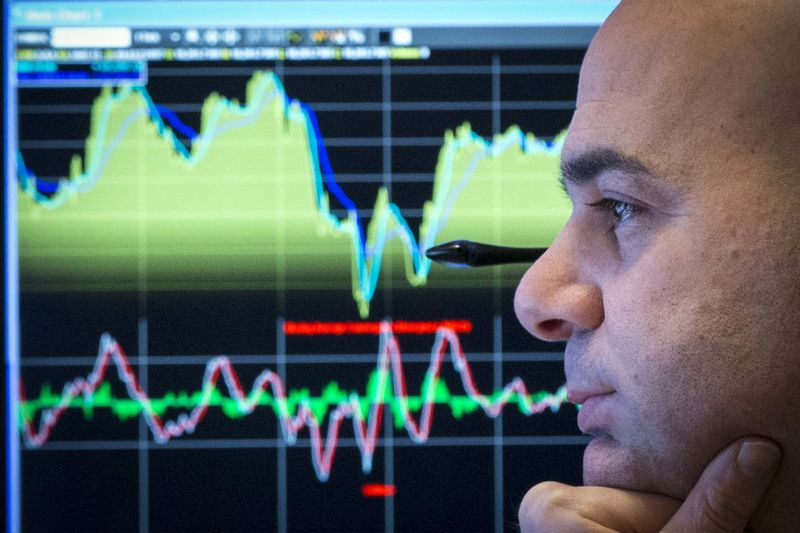US stock futures steady with China trade talks, Q3 earnings in focus
* Asian stock markets : https://tmsnrt.rs/2zpUAr4
* China touts plan to boost disposable incomes
* Speculation grows of aggressive central bank easing
* Bonds hold huge gains, more yield curves invert
* Euro dragged as ECB's Rehn flags Sept move
By Wayne Cole
SYDNEY, Aug 16 (Reuters) - Asian shares found some footing
on Friday after a turbulent week as China hinted at more support
for its economy, amid growing expectations of aggressive
stimulus from all the major central banks.
Sentiment got a lift when China's state planner said Beijing
would roll out a plan to boost disposable income, though details
were lacking. A bounce in U.S. and European stock futures also helped,
with E-Minis for the S&P 500 ESc1 up 0.55% and the EUROSTOXX
50 STXEc1 rising 0.5%.
MSCI's broadest index of Asia-Pacific shares outside Japan
.MIAPJ0000PUS responded by edging up 0.2%, though it was still
down 1% for the week.
Japan's Nikkei .N225 recouped early losses to be 0.09%
firmer, while Shanghai blue chips .CSI300 rose 0.7%.
The Sino-U.S. trade dispute remained a drag after Beijing on
Thursday vowed to counter the latest tariffs on $300 billion of
Chinese goods. U.S. President Donald Trump said on Thursday he believed
China wanted to make a deal and that the dispute would be fairly
short, despite it already lasting more than a year. With no settlement in sight, investors have hedged against a
global slowdown by buying bonds. Yields on 30-year debt
US30YT=RR hit an all-time low of 1.916% to be down 27 basis
points for the week, the sharpest such decline since mid-2012.
That meant investors were willing to lend the government
money for three decades for less than the overnight rate.
Such is the gloom that surprisingly strong U.S. retail sales
came and went with no impact on the bond rally. Analysts have cautioned that the current bond market is a
different beast than in the past and might not be sending a true
signal on recession.
"The bond market may have got it wrong this time, but we
would not dismiss the latest recession signals on grounds of
distortions," said Simon MacAdam, global economist at Capital
Economics.
"Rather, it is of some comfort for the world economy that
unlike all previous U.S. yield curve inversions, the Fed has
already begun loosening monetary policy this time."
CAVALRY COMING
Indeed, futures FEDWATCH imply a one-in-three chance the
Federal Reserve will chop rates by 50 basis points at its
September meeting, and see them reaching just 1% by the end of
next year. There were plenty of other signs the cavalry were coming.
European Central Banker Olli Rehn on Thursday flagged the
need for a significant easing package in September. Markets are keyed for a cut in the deposit rate of at least
10 basis points and a resumption of bond buying, sending German
10-year bund yields DE10YT=RR to a record low of -0.71%.
"Notions that the package will include a revamped QE
programme also saw a sharp rally in Italian, Spanish and
Portuguese debt," said Tapas Strickland, a director of economics
at National Australia Bank.
"If the ECB undertakes such substantive stimulus, it is
unlikely to do so alone given the upward pressure it would put
on the U.S. dollar."
Mexico overnight became the latest country to surprise with
a cut in rates, the first in five years. Canada's yield curve inverted by the most in nearly two
decades, piling pressure on the Bank of Canada to
All the talk of ECB easing knocked the euro back to $1.1099
EUR= and away from a top of $1.1230 early in the week. That
helped lift the dollar index up to 98.217 .DXY and off the
week's trough of 97.033.
The dollar could make little headway on the safe-haven yen,
though, and idled at 106.20 yen JPY= .
The collapse in bond yields continued to make non-interest
paying gold look relatively more attractive and the metal held
at $1,521.20 XAU= , just off a six-year peak.
Oil prices were trying to bounce after two days of sharp
losses. Brent crude LCOc1 futures added 46 cents to $58.69,
while U.S. crude CLc1 rose 59 cents to $55.06 a barrel. O/R
Asia stock markets https://tmsnrt.rs/2zpUAr4
Asia-Pacific valuations https://tmsnrt.rs/2Dr2BQA
^^^^^^^^^^^^^^^^^^^^^^^^^^^^^^^^^^^^^^^^^^^^^^^^^^^^^^^^^^^>
(Editing by Sam Holmes and Jacqueline Wong)
